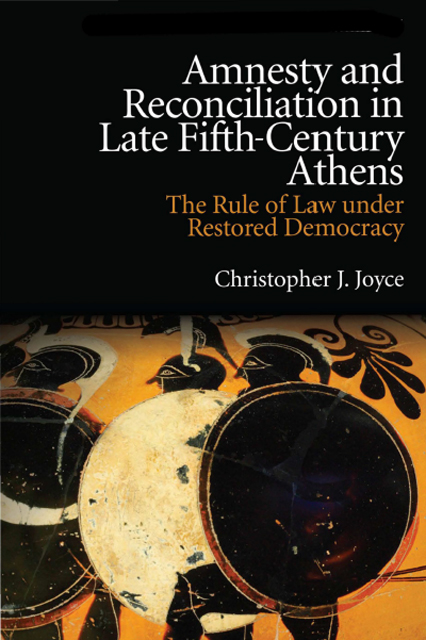Book contents
- Frontmatter
- Contents
- Preface and Acknowledgements
- List of Abbreviations
- 1 Introduction: The Athenian Reconciliation in Modern Scholarship
- 2 Civil Strife at Athens, 404–403
- 3 Oaths and Covenants
- 4 The Legal Scrutiny and the Resurrection of the Rule of Law
- 5 The Amnesty Applied (I): The Trials of Agoratus and Eratosthenes
- 6 The Amnesty Applied (II): The Trials of Callimachus and Socrates
- 7 The Athenian Reconciliation as the Paradigm for the Greek World in the Classical and Hellenistic Ages
- 8 The Rule of Law Restored: The Legacy of the Reconciliation in the Fourth Century
- Bibliography
- Index Locorum
- Subject Index
7 - The Athenian Reconciliation as the Paradigm for the Greek World in the Classical and Hellenistic Ages
Published online by Cambridge University Press: 03 June 2023
- Frontmatter
- Contents
- Preface and Acknowledgements
- List of Abbreviations
- 1 Introduction: The Athenian Reconciliation in Modern Scholarship
- 2 Civil Strife at Athens, 404–403
- 3 Oaths and Covenants
- 4 The Legal Scrutiny and the Resurrection of the Rule of Law
- 5 The Amnesty Applied (I): The Trials of Agoratus and Eratosthenes
- 6 The Amnesty Applied (II): The Trials of Callimachus and Socrates
- 7 The Athenian Reconciliation as the Paradigm for the Greek World in the Classical and Hellenistic Ages
- 8 The Rule of Law Restored: The Legacy of the Reconciliation in the Fourth Century
- Bibliography
- Index Locorum
- Subject Index
Summary
Almost four centuries after the Athenian Reconciliation, the Roman orator Cicero addressed the Senate in the wake of Julius Caesar’s assassination, calling for unity in Rome in a time of emergency. The state had been torn apart by political dissentions and civil wars, in consequence of which Caesar had taken on the unprecedented title of ‘dictator for life’ after establishing total supremacy. His overweening hubris proved too much, and on the Ides of March Caesar was murdered in the vicinity of the Theatre of Pompey. His assassins claimed to have liberated Rome from a tyrant, but the removal of a dictator paved the way for further ructions. Among the political heirs of Caesar was Mark Antony, an ambitious, scheming general who swore to avenge the dictator’s death. Rome now faced a fresh crisis, how to reconcile political factions whose sworn objective was to wreak revenge. Cicero, whose sympathies resided with the conspirators, strove to bring about a concordat. In return for amnesty, the Senate pledged not to declare Caesar a tyrant, and allowed the Caesarian faction to continue as a legitimate force. In his tirade against Antony, Cicero appealed to the ancient example of the Athenians, which shone out as a paradigm of peace and reconciliation. Its purpose had been to consign to everlasting oblivion any memory of disunity and discord in the interest of restoring harmony to the city. Despite the very great bitterness which the memory of civil conflict had entailed, Athenians had been willing to put recollections of past evils to bed. It was a noble model of wisdom and foresight at a time of political crisis, when the temptation might otherwise have been to pursue internal divisions further and undermine any hope of securing a lasting peace. In imitation, Cicero even used the chosen legal phrase of the Athenians, μὴ μνησικακεῖν.
Looking back upon the Athenian example from almost four hundred years’ distance, it is tempting to wonder to what extent Cicero’s view of that ancient amnesty was infused with the romanticism of hindsight. As the last two chapters showed, the more contemporary evidence of the Attic orators could arouse doubt that memories of the recent past were ever so conscientiously banished as Cicero would later believe, but what is striking is that for four centuries the Athenian example was not forgotten but held up as a paradigm.
- Type
- Chapter
- Information
- Amnesty and Reconciliation in Late Fifth-Century AthensThe Rule of Law under Restored Democracy, pp. 180 - 204Publisher: Edinburgh University PressPrint publication year: 2022

